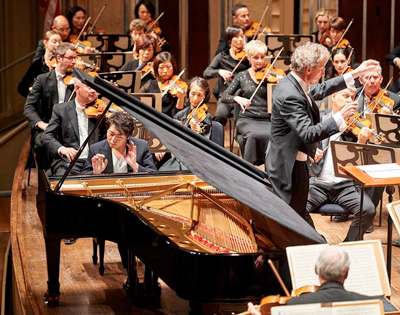by Daniel Hathaway

On Thursday evening, Chopin and Strauss bracketed intermission. Joined together ever since Chopin played them that way in 1835 at the Paris Conservatoire, the Andante spianato is a delicate, introspective piece for solo piano, while the Grand Polonaise brillante is indeed both grand and brilliant — and supported by an orchestra with double winds, horns, trombones and timpani.
Lang played sensitively and ruminatively in the Andante, then unleashed all his pianistic flair in the Polonaise. An amiable show-off, he tossed off its difficult passages with abandon while mugging at the audience, and his hands came off the keyboard in what could become a whole photo gallery of histrionic releases. In a piece without a lot of musical profundity to distract the mind, that was fun to watch.
Richard Strauss couldn’t play the solo part of his own Burleske, but it poses no problem at all for Lang Lang. Crystalline conversations between piano and winds turned a bit steely as the pianist warmed to the subject, but his playing was wonderfully rhythmic and his linkups with the orchestra were masterful. Even when he’s not playing, Lang Lang remains completely in the game, making little conducting motions and moving to the music. After he dispatched page after page of complicated solo passages, the piece ended with a tinkling, upward flourish and — like it began — with a timpani stroke.
Thursday evening’s concert began with the presentation of the orchestra’s distinguished service award to James D. Ireland III, and continued with the first performance of Matthias Pintscher’s Idyll, a Cleveland Orchestra co-commission with the Bavarian Radio Symphony and the Melbourne Symphony. The huge orchestra included acres of percussion (a huge thunder sheet ominously hung from the stage house), a contrabass clarinet (itself ominously towering above the expanded wind section), two harps, piano and celesta.
Though Pintscher suggests there are no “declared allusions” in Idyll, the title invokes the idea of a calm, picturesque scene. A very calm one for most of the 25-minute duration of the work, because Pintcher mostly uses all that percussion firepower with infinite subtlety. The alto flute rises out of percussion whispers at the beginning, and a series of similar solos or cadenzas follows, including a long, central one for the piano, (expressively played here by Joela Jones). Sudden bursts of activity are crowned by mallet instruments and timpani. Discordant brass lines devolve into fanfares, then the thunder sheet comes into dramatic play.
In this performance, a lot of the denouement was close to inaudible — there were long moments toward the end when it seemed that Pintscher had given Welser-Möst his own cadenza for solo baton.
The concert ended with an energetic romp through the tale of Till Eulenspiegel as told by Richard Strauss. Principal horn Richard King introduced the rascally Till in flawless solos at the beginning, and E-flat clarinetist Daniel McKelway summed his character up again in sassy licks toward the end. Though perhaps not the tightest performance of Till’s merry pranks Severance Hall has heard, Welser-Möst’s reading was playful and full of wry humor. He even did a little dance on the podium at one point.
Photo by Roger Mastroianni.
Published on ClevelandClassical.com October 14, 2014.
Click here for a printable copy of this article.



